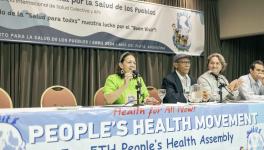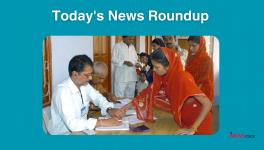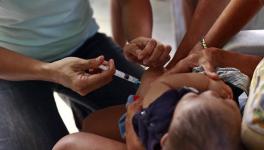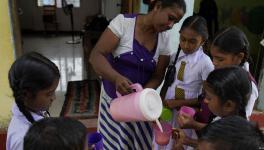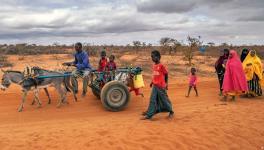40 Years of Alma Ata Declaration: ‘Health for All’ Still a Far Cry
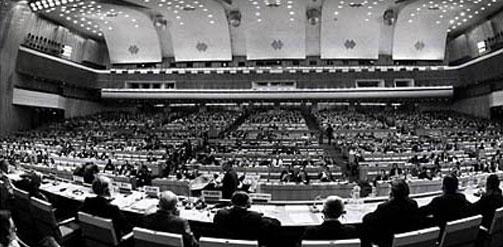
The International Conference on Primary Health Care at the Lenin Convention Centre in Alma-Ata in September 1978.
“Primary health care is essential health care based on practical, scientifically sound and socially acceptable methods and technology made universally accessible to individuals and families in the community through their full participation and at a cost that the community and country can afford to maintain at every stage of their development in the spirit of self-reliance and self-determination.“ (Declaration of Alma-Ata)
The Primary Health Care (PHC) principles affirm health as a human right based on equity and social justice, implemented through community engagement, health promotion, the appropriate use of resources, and inter-sectoral action based on a “New International Economic Order” with the vision of health for all by the year 2000.
The [Alma Ata]Declaration, which completes 40 years in 2018, however, came at a time of major global economic changes, including the economic slowdown of the 1970s, the debt crisis and structural adjustments. Shortly after Alma Ata, UNICEF and the Rockefeller Foundation declared “Selective Primary Health Care” instead of “Comprehensive Primary Health Care”, which under structural adjustments became the dominant paradigm and model of PHC. Structural adjustment programmes led to a reduction of staff, narrow benefit packages and a lack of resources in the public sector and weakened already weak health systems.
In 2010, the World Health Organisation (WHO) introduced the concept of Universal Health Coverage (UHC), which was defined as access to health services without financial hardship. While in general, the notion of UHC seems consistent with the concept of Health for All, a key issue that remains unresolved is the primacy provided to public or non-for-profit services under PHC and conversely the larger role envisioned to private for-profit providers while implementing UHC. Hence, in many countries public services are being replaced by private for-profit providers. Especially concerning is the increase of corporate chains of providers, mainly supported by private insurance.
While impressive medical and technological advances have taken place around the world, improvements in the health status of the people have been moderate and inconsistent between and within countries. The biomedical and technical approach to health has its limitations in actually improving health, especially among marginalised and poor populations and has contributed to a neglect of other determinants of health.
Health systems must be built on the principles of comprehensive primary health care that includes community engagement, adequate healthcare infrastructure, skilled, supported and motivated health workforce, access to essential drugs of good quality that are rationally used in addition to new advancements and technologies that must be accessible to all.
Communities as Owners and Partners
“The people have the right and duty to participate individually and collectively in the planning and implementation of their health care.” (Declaration of Alma-Ata)
Communities are at the heart of PHC and must be the owners and partners in making Health for All a reality. They must not be reduced to mere consumers of health services and health systems must be accountable to people and the communities they serve. Strong people’s organisations and movements are fundamental to more democratic, transparent and accountable decision‐making processes in health.
Community health workers are an important link between communities and the formal health system. They play an essential role in order to strengthen local health services and make them accessible to all. Therefore, community health workers must be recognised in their specific role, supported, trained and remunerated accordingly.
Community health workers must become part of a skilled and motivated health workforce. In the light of changing demographics globally, global health worker migration and a gap in trained health workforce, health systems must ensure an environment that will enable and retain skilled and motivated health workers at all levels.
Justice, Cooperation and Solidarity
“The existing gross inequality in the health status of the people particularly between developed and developing countries as well as within countries is politically, socially and economically unacceptable and is, therefore, of common concern to all countries.” (Declaration of Alma-Ata)
Health is not only a matter of human rights, but also of justice. Governments who are not making provision for decent health care are denying justice to their people.
The Alma Ata declaration recognised the need to restructure the global economic order to address inequalities and enable countries to generate resources for decent health care and tackle the root causes of poor health. This still remains a critically important task today.
In contrast to the New International Economic Order referred to in the [Alma Ata] Declaration the dominant contemporary paradigm of export- led development has contributed to loss of tax receipts at country level because of the competition for investment which drives reduced tax rates and constant pressure to reduce the cost of production or extraction. These have led to a deterioration of people’s living circumstances and contributed to ill health, instability or even war.
It is vital that we build solidarity between people within and across nations and regions. The existing system of international aid and the associated charity narrative legitimise an unfair economic framework which prevents national self-determination and weakens the building of strong and resilient local health systems. Health for all requires the redistribution of wealth nationally and globally.
Public financing is essential for health for all. This requires tax justice that will clamp down on tax avoidance and control tax competition between countries. The regulation of transnational corporations through appropriate agreements is essential.
Addressing Root Causes of Health Inequity
“The attainment of the highest possible level of health is a most important world-wide social goal whose realization requires the action of many other social and economic sectors in addition to the health sector.” (Declaration of Alma-Ata)
The WHO’s Commission on Social Determinants of Health in 2008 demonstrated that poor health is not randomly distributed, but rather follows a predictable pattern with systematic differences among social groups (i.e. gender, class, race/ethnicity) caused by unequal exposure to, and distribution of, social determinants of health (SDH). Social justice is a matter of life and death. Addressing root causes of health inequity and investing in society, is the only way that health for all and sustainable development can be achieved.
The broader context, shaped since the late 1980s by neoliberal economic globalisation, has profoundly influenced our health situation today. This can be seen in the impact of globalisation on social justice, the effect of climate change on livelihoods; the loss of biodiversity, the detrimental effects of agribusiness on peasant farmers and small-holder farmers, who provide most of the world’s food; the impact of land grabbing and the grabbing of water bodies by big business; the influence of patriarchy on society; tax evasion leading to the lack of public funds; the unbridled growth of the arms trade; and the effects of migration to name only a few. All these issues require collaboration across sectors and policies that will address the root causes of illness and the determinants of health inequity.
As in the Alma Ata Declaration, a new global economic order is needed to facilitate a safe and just space for humanity.
We call upon governments and people from across the globe to take forward the principles of Primary Health Care that are so clearly articulated in the Alma Ata Declaration.
Get the latest reports & analysis with people's perspective on Protests, movements & deep analytical videos, discussions of the current affairs in your Telegram app. Subscribe to NewsClick's Telegram channel & get Real-Time updates on stories, as they get published on our website.









